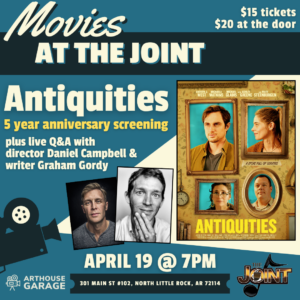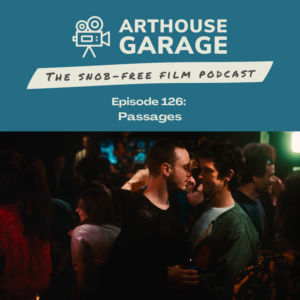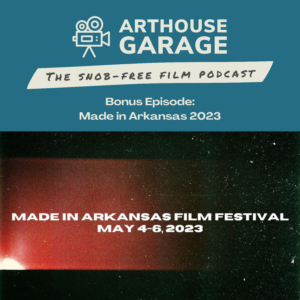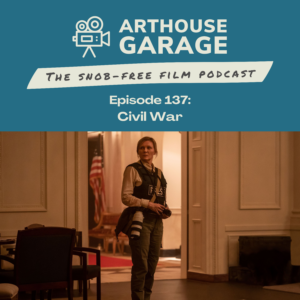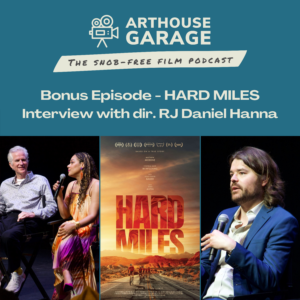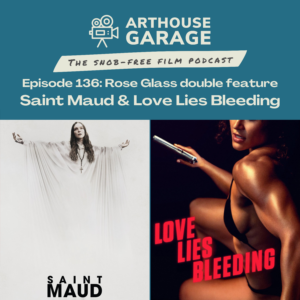Read the transcript below:
Andrew Sweatman 0:08
Hello, hello and welcome back to art house garage, the snob free film podcast where we make Arthouse indie classic and foreign cinema accessible to the masses. I’m Andrew Sweatman and at our house garage we love to discuss challenging films. We’re actually in the middle of season five of the podcast, looking at contemporary Asian filmmakers, like Bong Joon ho and Hirokazu koreeda. In fact, our very next episode will look at Korea’s film shoplifters. Another thing we love to do at our house garage, though is support the local film community here in Arkansas. And one way we do that is by highlighting local film events, filmmakers and film festivals. So there’s another great film festival coming up the Fayetteville Film Fest. This is the 12th annual festival and it’s coming up november fifth through the 14th. And like so many other festivals in 2020, the Fayetteville Film Fest will be all online this year. I’m joined today by the festivals executive director, Russell Sharman. Russell, thank you so much for joining me today. And how are you?
Russell Sharman 1:08
I am great. And thank you for asking. And thank you for having us.
Andrew Sweatman 1:12
Yeah, of course. I’m excited about the festival. So yeah, tell me and so if someone has never heard of the Fayetteville Film Festival, tell us what sets it apart from other festivals? And what criteria does a film have to meet to qualify for this festival?
Russell Sharman 1:27
Sure, well, like most festivals, the only real criteria to to qualify as quality. But, but I I do want to really stress that I think what makes the Fayetteville phone vest special is from the very beginning, which is before my time. The the festival has been dedicated to celebrating supporting and encouraging local filmmaking. So while you know in some ways, this encompasses everything that we do, whether it’s bringing in independent film to Northwest Arkansas, or celebrating local filmmakers. The idea is if we can bring those filmmakers to Northwest Arkansas, maybe they’ll make their next film here. Or that we can sort of encourage the local community to collaborate get together network, which is of course going to be somewhat more of a challenge this year. But that is typically our focus is is that idea of fostering that local film community it feels like nowadays, film festivals are almost like craft breweries. Every every region has one. And in Arkansas is no exception. There There are, it seems to me about a dozen now in the States. And I figure the more the merrier. If each one can focus on sort of what makes their region special in terms of content creation, then we could finally start to see more and more production come to Arkansas.
Andrew Sweatman 2:50
I love that. I think that’s great. And you know, it’s that’s so true. It seems like there’s just film festivals popping up everywhere. And people typically are kind of surprised if they’re not from Arkansas. And I tell them hey, actually Arkansas is film communities is growing. And it’s pretty exciting. I so I long for the day when people aren’t surprised to hear that, you know that. That Arkansas, it really is a good hotspot for film here in the south. Yeah. So how will the festival look different this year? You kind of alluded that it’s different. And I mentioned at the top that it is going to be I think all online, is that right that everything is online? And what’s the platform? And how do we tune in?
Russell Sharman 3:30
Sure, yeah, it is going to be all online this year. And we really struggled with that decision. Again, as I’ve said, from the beginning the mission of the festival, which used to be called the offshoot Film Festival, it was an offshoot of a local organization called ceiling film. And that went through a rebranding a few years back to become the Fayetteville Film Fest. But from the beginning, it’s always been focused on the local filmmaking community and this idea of creating and fostering that community. And that’s really hard to do online. And we really struggle with whether or not we should even have the festival this year. But we thought the first thing we should do is ask our submitters, what do they want it? You know, especially in this time, if you’ve if you’ve put your heart and soul into a film, whether it’s a five minute short or a two hour feature? Do you do you want it to be on an online platform? Do you do you crave that audience interaction which I know I do as a filmmaker? I really missed that. So we asked them what what did they want did they want to wait until next year for hopefully an in person festival or an online version and almost 90% asked for an online event. So we listened and that is what we were doing. And we soon discovered that there were things we could do with an online platform that we’ve never been able to do. In a live event. Normally normally our fest is fairly small. We sort of crowded off into a three or four day weekend. And we realize, well, now we can sort of spread that out a bit. And nor do we have to worry about overlapping programming. So we have more feature films than we’ve ever had in the history of the festival this year because of the flexibility of the online platform. And we’re also able to do more live stream panels, we’re going to have at least four live stream panels, again, focused mostly on the idea of film production in the state of Arkansas. So we’re really excited about that we hope to have some breakout rooms for people to interact with each other and with local production companies, as well as our annual Fayetteville film prize where we do a pitch contest, we’re still going to do that it’s just going to be in a Zoom Room instead of a live room. We’ve got a few other things planned. But I’m actually pretty excited about the online version this year. Yeah.
Andrew Sweatman 5:50
Yeah, I think it’s been interesting to kind of see innovation happen there. Because it logistically does make a lot of things easier if we don’t have to all be in one spot and worry about hotel rooms and all that kind of stuff, too.
Russell Sharman 6:00
So yeah, I think it’s interesting to see kind of that trend, and what might we hold over? Once things are kind of more back to normal? What might we keep from this kind of thing? It’s, I think, yeah, I think that’s true for for a lot of things. I also teach film. And in sort of learning the ways in which you, I suppose, in some ways, ironically, we’re interacting with a screen when we teach film. And some of that supposed to be a handicap, when in fact, there are ways we can really embrace it and use it to our advantage. And the platform we’re using, which you you had asked is the platform that a lot of folks have turned to vintage is a platform that’s been around a while for ticketing for festivals, and they very smoothly pivoted to a streaming platform that allows us to do all kinds of great things for our filmmakers, like do digital rights management. So it’s copyright protected, and we can lock off the geographic regions where people can watch and just in case, there’s a distributor who wants to limit that. So it’s actually been really flexible and really great. And I’m, I’m really pleased with the way that it’s going to look.
Andrew Sweatman 7:00
Yeah, that’s great. I’ve used a vintage for a few things recently. And it’s really easy and smooth. And I watch on Apple TV, they’ve got an app, it’s really, really simple and great in that way. You mentioned the geographical region, do you have to be in Arkansas to attend? Or is there? Is there a limitation on that?
Russell Sharman 7:17
No, the only limitation we’ve put on Sora programming is North America. So in fact, that’s another benefit is that, you know, filmmakers who in the past, you know, we probably get, I would say at least half the filmmakers actually come in town, which is great. But because you know travel can be difficult. And as you said earlier, not a lot of people think of Arkansas as a hotbed of film production that we’d like to change that. So one of the things that we’ve struggled with is getting filmmakers to actually come visit us when when their films are in our program. Well now because it’s online, I hope to get a lot more traffic to our content, and then hopefully show them through our live panels and just the spirit of the thing that perhaps they’d like to visit in person next time. And frankly, we’re, we’re saving a little money this year by doing it online. We hope to pour that into hotel rooms next year and see if we can’t get more folks to come visit. I love it. Yeah,
Andrew Sweatman 8:10
that’s great. Well, let’s talk about some of the movies. So the festival is broken down generally into narrative and documentary features, and then narrative and documentary shorts. So let’s look at the narrative features. Is there anything that you’re just especially excited about this year?
Russell Sharman 8:26
Well, you know, it’s like, it’s like your children. Not that I have children, but I would never want to choose. Right, right. My favorites. They’re all really great. Honestly, there’s a the one of the things we’ve decided to do as well is even though it’s all online, we are still scheduling out that opening weekend as though it were an in person festival. So each film sort of gets a little glory at a premiere date and time. Once it goes live, it will be available for the week. But the first film we have in the lineup is electric Jesus, which is a kind of hilarious and very polished, comedic feature about a heavy metal Christian rock band. Oh, wow. Just fantastic. I’m
Andrew Sweatman 9:09
excited. So the title of that, and that really stuck out to me. It’s like, Oh,
Russell Sharman 9:11
it’s one catch that one. Yeah. And and then we’ve got a really sort of fascinating, quirky interest, really interesting filmmaker, with a feature called a dim Valley. That is one of those films that you kind of don’t know what you’re getting into. And then by the end, you’re still not sure what you just went through, but it was fascinating.
Andrew Sweatman 9:31
Yeah.
Russell Sharman 9:33
And we have a couple of others. One that’s a local production from Fort Smith called the Rock of Gibraltar, which is sort of an incredible feat that this crew pulled off this very rich film noir setting all shot in this really sort of beautiful high contrast black and white, as well as a film from Canada called vagrant, a kind of heavy drama about a man experiencing homelessness who before A dog.
And it is quite moving.
Andrew Sweatman 10:03
Those all sound great. I will say, I have seen one of these actually Rock of Gibraltar, I happen to be good friends with the director Michael Farris the you know, kind of backyard ridiculous home movies that he made in high school, I was often in the US we went to high school together. So I can recommend Rock of Gibraltar having already seen it. It is. Yeah, very stylish, very, you know, dark and gritty. And it’s this great Arkansas story. So yeah, and that one I think people really enjoy. And so yeah, you mentioned as far as the format of think there is a sort of a premiere time. So you could sit and watch these all in order and have that festival experience if you want. Or you can go kind of on demand over the next several days and kind of take a Netflix approach to picking jumping around, which I think is a really cool way to do that. Well, let’s look at the documentaries. What’s happening in the documentary feature space, this will this
Russell Sharman 10:54
is where we got to go a little crazy, which was really fun. Normally, we really have to limit these we typically have three to four narrative features a year, and two to three documentary features. But this year, we have I believe, six Documentary Feature films, which is so exciting because we got so many great submissions that we we could we could really embrace a large number of them, which was really fun. Some of them you know, are just absolutely devastating films one called dear child about children coming out of very difficult experience is in Brazil, to this really moving poetic, beautiful film called foreign puzzle about a Mexican American choreographer, dancer, going through breast cancer treatment and choreographing a dance about that process is just gorgeous, as well as a really timely documentary called Hamtramck USA, which is about the the first city in America that is sort of predominantly Muslim and the local election for city council and mayor in that town. And you know, I almost wish our festival was before the election. So folks could see this because it is such a beautiful image of what democracy can and should look like in terms of the way people run their campaigns and why they run. And just sort of the the pluralism that I think makes America so wonderful. We also have a couple of great local documentaries, one that I know a lot of folks are gonna be excited about. It’s Arkansas rock and roll royalty, the cape brothers. It’s a documentary about the cape brothers with a lot of concert footage, which is beautifully shot and a very high definition rich, beautiful, 4k presentation and and then we also have one from local faculty here at the University of Arkansas called Indians outlaws marshals and the Hanging judge, which involves a lot of dramatic recreations as well. So it’s a little bit of a hybrid there. And then we also have a sort of showcase screening a film that’s actually not in competition. But one of our board members, who is also lives in Oklahoma has brought in which I am really excited about by a really gifted, extraordinary filmmaker named Sterling hundred harjot. Called Love and fury, where he followed for indigenous artists, musicians, mostly all around the world for a year and follow their artistic process. And it’s, it’s also a stunner.
Andrew Sweatman 13:29
Yeah, I love there’s a couple of music, focus things. That’s really great. I love a good music documentary. And then actually one of these actually have already seen as well, and that is Indians outlaws marshals in the Hanging judge. I’m from Van Buren. And so that’s a lot of Fort Smith history in that one. And that one was very interesting. So you know, I grew up hearing this history, but I didn’t really have all the context until watching that. So for local people, and I think that’s gonna be a really good one to watch as well. But these all sound great. And I can’t wait to to partake and try to watch all this stuff. That’s great. Let’s see. Is there anything else that we need to discuss about the festival? Anything that we haven’t talked about yet? Or do you want to talk about short films? Yeah. What do you think?
Russell Sharman 14:09
Well, we have, we have as we always do, a great lineup of short films, both local and from around the country. But one thing that I a couple of things, actually that I would want to stress is one we decided this year, partly because it’s online, partly just because 2020 has been a hard year for everyone. So all of our programming is available on a pay what you can model which means if if you can’t afford it, all of them are available for free. Of course, we would love folks to show up and help support the festival as well as our streaming costs because it’s not free for us. But we want to make it free for anyone who chooses that. But we also have something fun that I think this year it’s the Friends of the fast all access pass. For $40. You could buy a pass that is committed. In the sense that it unlocks all of the programming, so you don’t have to go through the hassle of choosing each one. But you also get a nice little gift bag of festival swag. As if,
Andrew Sweatman 15:09
as if you were here with us, if you support anything on Patreon over a year, you’re going to spend more than $40. So that’s, I think, a really great price to get swag and everything else. That’s great. Well, awesome. I hope that everyone listening can can get in and at least catch a few things this year. That is starting November the fifth through the 14th. And that, what’s the website that we can find all that information?
Russell Sharman 15:37
The website is Fayetteville film fest.org. And you can also at that website, not only see our programming by the past, check out the streaming platform, but you can also register for the Fayetteville film prize, where you have the opportunity to pitch your short film idea in five minutes or less and could win $2,000 to make your short film,
Andrew Sweatman 15:59
which is pretty exciting. How exciting is that? That’s really cool. I
Russell Sharman 16:02
guess the third year we’re doing this and it’s it’s always a lot of fun. We’ll see what it’s like online this year. That’s really cool.
Andrew Sweatman 16:09
Well, thank you so much, Russell, I really appreciate you joining me today and filling us all in. We hopefully will have you you can come back on the show anytime to just discuss a Hollywood movie if you’d like I’d love to have you back and I look forward to the festival.
Russell Sharman 16:23
Well, thanks so much.
Andrew Sweatman 16:24
And thank you so much for listening to art house garage. We’ve got a few years worth of episodes now you can hear all of those in your podcast app of choice. If you want to support art house garage, leave a rating or review in your podcast app. Or you can buy an art house garage t shirt at art house garage comm slash shop. You can stay in the loop about our house garage and the Arkansas film community by subscribing to our email newsletter by going to our house garage comm slash subscribe or you can email me directly Android archives garage. And of course follow on social media you can find us on Facebook, Twitter, Instagram and letterbox just search at art house garage and all those places. And that will do it for this episode. Thank you again so much for listening and until next time, keep it’s now free.
Transcribed by https://otter.ai






